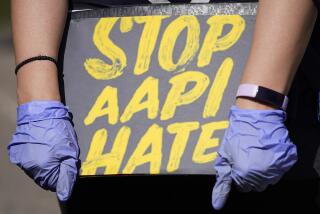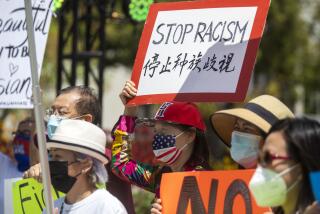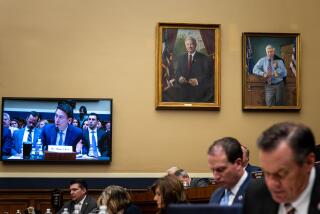Thousands march around Los Angeles as part of ‘Stop Asian Hate’ rallies across the country
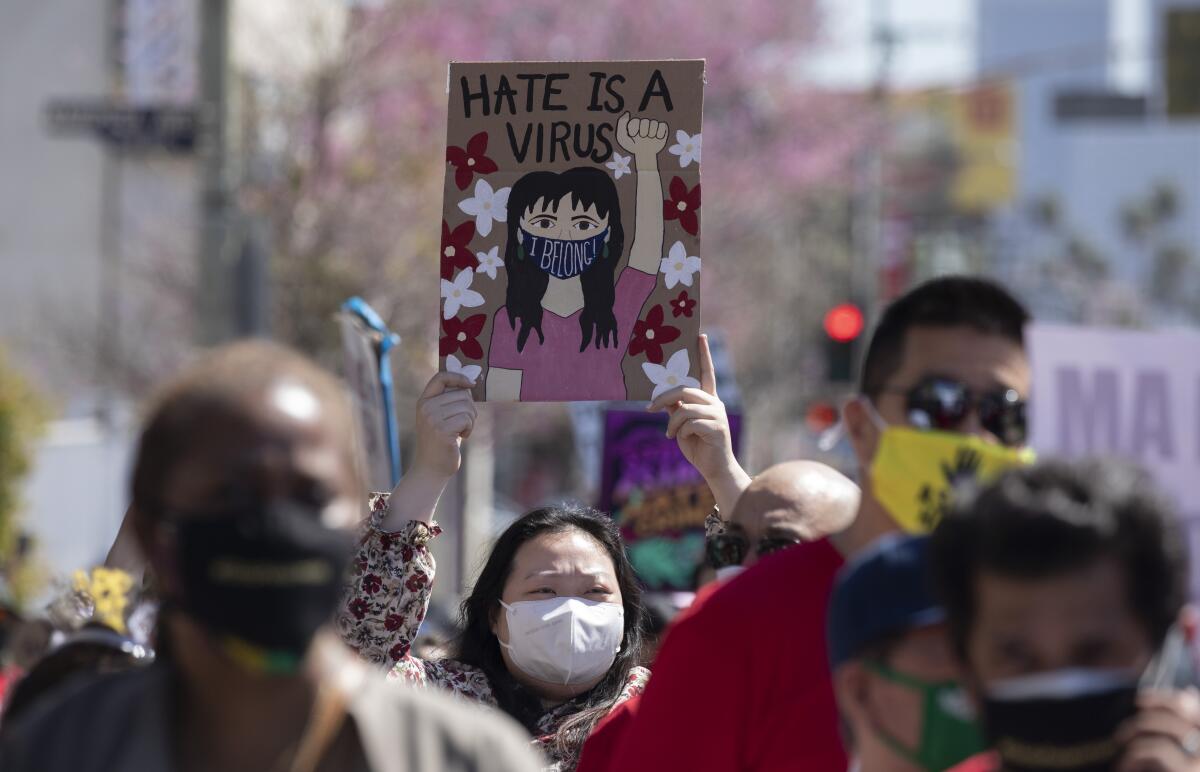
- Share via
Hundreds of demonstrators gathered in Koreatown on Saturday for a unity rally and march down Olympic Boulevard to demand an end to the surge in anti-Asian racism and violence, including the Atlanta-area killings earlier this month, that have stoked fear and outrage in the community.
Drums and chants filled the air as demonstrators marched and lifted signs saying, “#Stop Asian Hate” and “Enough is enough.”
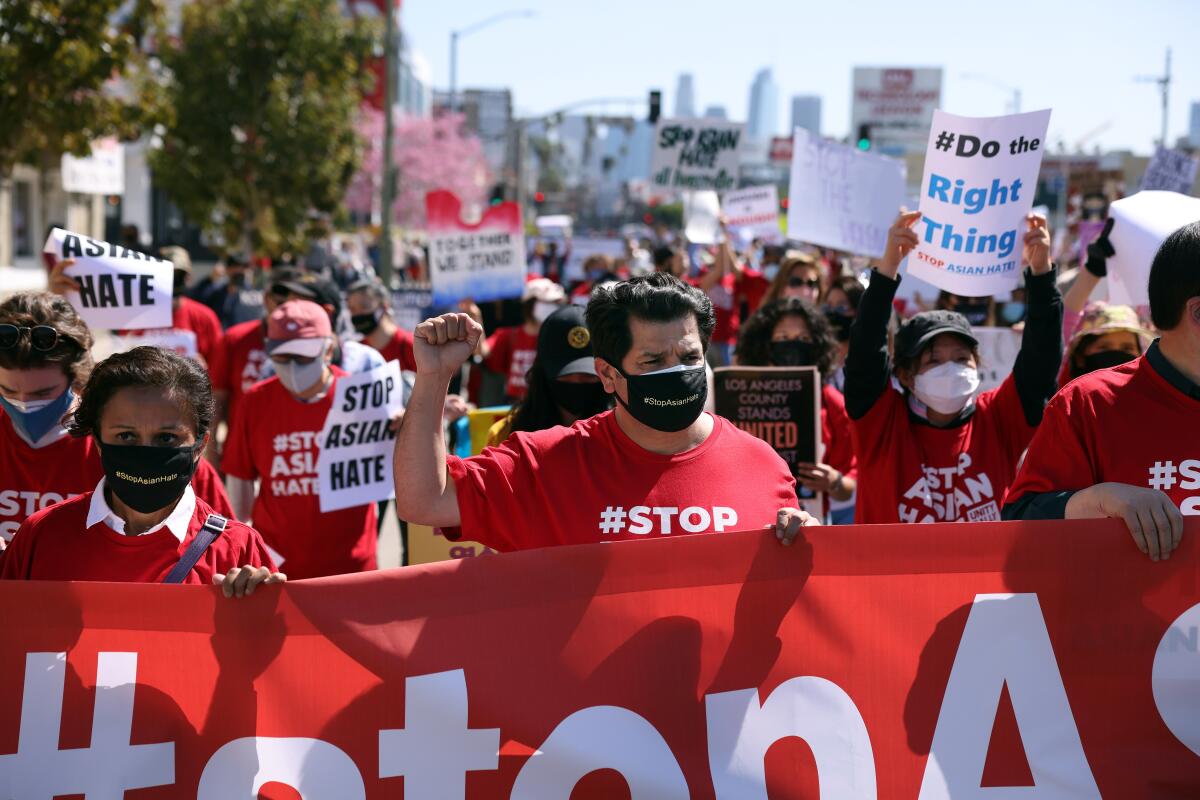
At the rally, community leaders, local politicians and activists shared emotional stories about being bullied, scapegoated, discriminated against and treated as if they are outsiders or something less than American. Many spoke out against the alarming increase in hate crimes against members of the Asian American and Pacific Islander communities during the pandemic and demanded government action to stop the racist attacks.
Friends Christina Huynh, 39, and Carolyn Dao, 32, drove to the rally together from Orange County after learning about the event on social media from celebrities Kelly Hu and Olivia Munn.
“I’m sick of all the hate — the entire mentality of blaming the new group,” said Dao, a psychology student at Cal State Long Beach who is from Garden Grove. “It’s sickening to see people go after our most vulnerable.”
Dao said her breaking point was the killing of eight people, six of them women of Asian descent, in the Atlanta area this month. Cherokee County Sheriff’s Capt. Jay Baker told reporters that the man arrested in connection with the killings was having “a really bad day” and had blamed “sex addiction,” not racism, for the massacre.
Dao felt helpless, and enraged by the comments that seemed to sympathize with the suspect rather than the victims.
“It being written off as a ‘bad day,’ that’s what did it for me,” Dao said.
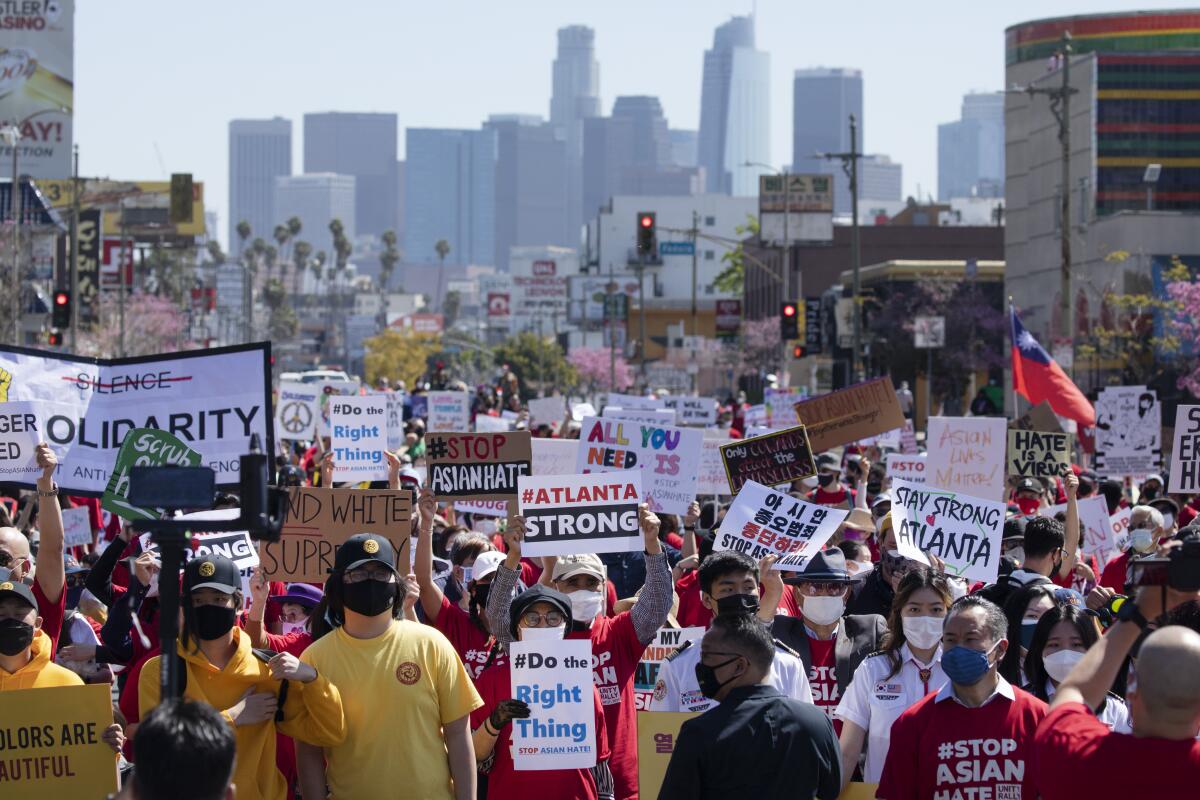
Baker was later removed as spokesman for the case after it emerged that a Facebook page appearing to belong to him promoted sales of an anti-Asian T-shirt that blamed China for the coronavirus crisis.
“I’ve experienced racism my whole life, but I’ve just kept it to myself,” said Dao, whose parents came to the U.S. as refugees from Vietnam. “I was taught to keep my head down, to not make waves.”
Additional rallies were staged in downtown Los Angeles and in West Hollywood. Dozens of protesters gathered at La Cienega and Santa Monica boulevards, chanting and cheering across the busy intersection as lines of cars drove by honking their support.
Ann Le of Los Angeles held a sign bearing the face and name of Vincent Chin, the Chinese American man whose 1982 fatal beating near Detroit remains a flash point in anti-Asian racism in America. His killers, two white men, served no jail time and were fined $3,000.
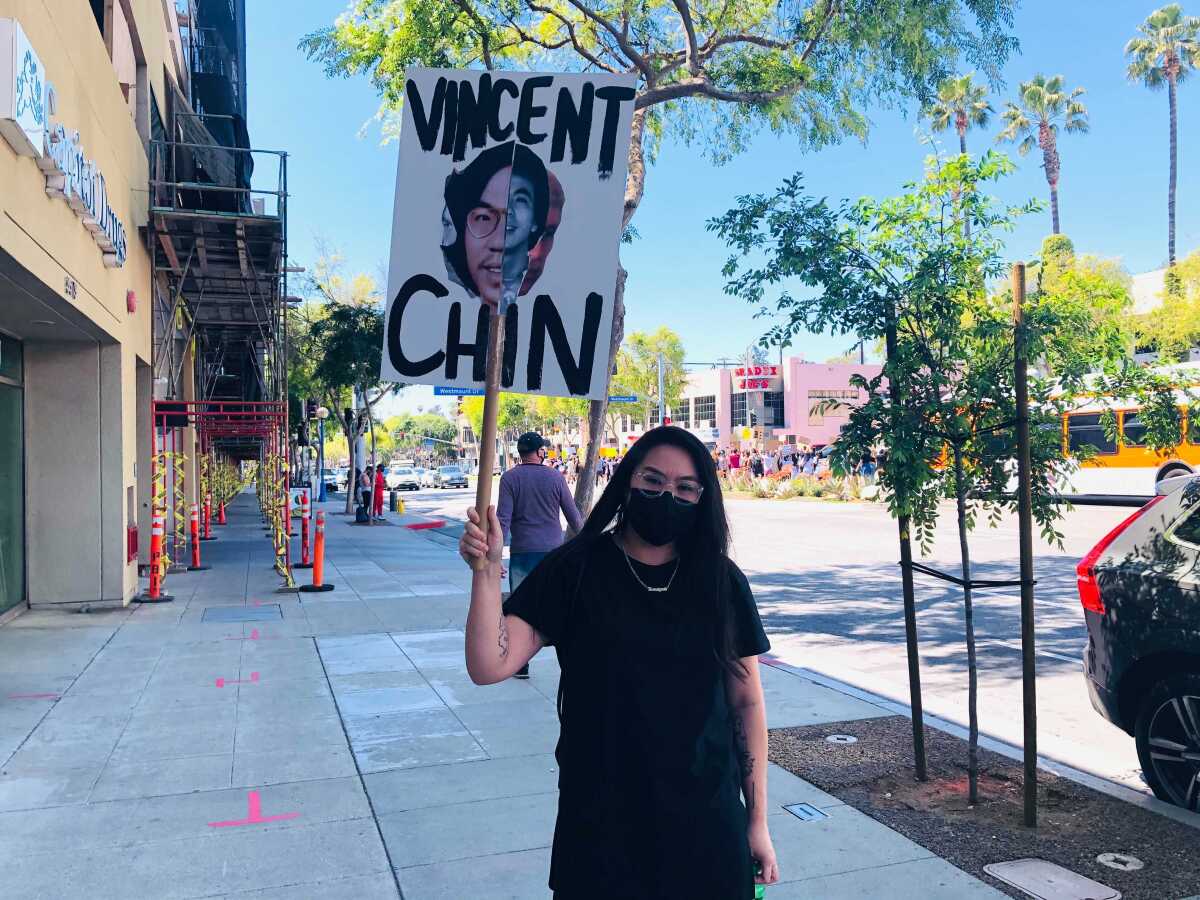
“During the Atlanta shootings, I was so upset,” said Le, 39. “I didn’t know how to channel my anger, and I was really depressed about it.” A collage artist whose work is largely inspired by the Vietnamese American experience, Le created a sign from her original piece foregrounding Chin’s image against the faces of his killers.
Le participated in the march because “we need everybody,” she said. “I think about the model minority myth, where we are kind of silent and we’re scared and we might not show up. I felt like I needed to show up.”
The events were part of a national day of action promoted by the ANSWER Coalition, the Korean American Federation of Los Angeles and several additional community organizations with similar rallies taking place in other cities in California and across the U.S., including Atlanta; Boston; Chicago; Detroit; Honolulu; Philadelphia; Portland, Ore.; Queens in New York City; and Seattle.”
Since coronavirus shutdowns began last March, thousands of Asian Americans have faced racist verbal and physical attacks or have been shunned by others, according to a recent report by Stop AAPI Hate. Anti-Asian hate crimes have soared in Los Angeles and other major cities. Official statistics capture only a fraction of the incidents, because many go unreported.
Experts say the hatred has been stoked by misplaced blame over the pandemic and the inflammatory rhetoric of former President Trump.
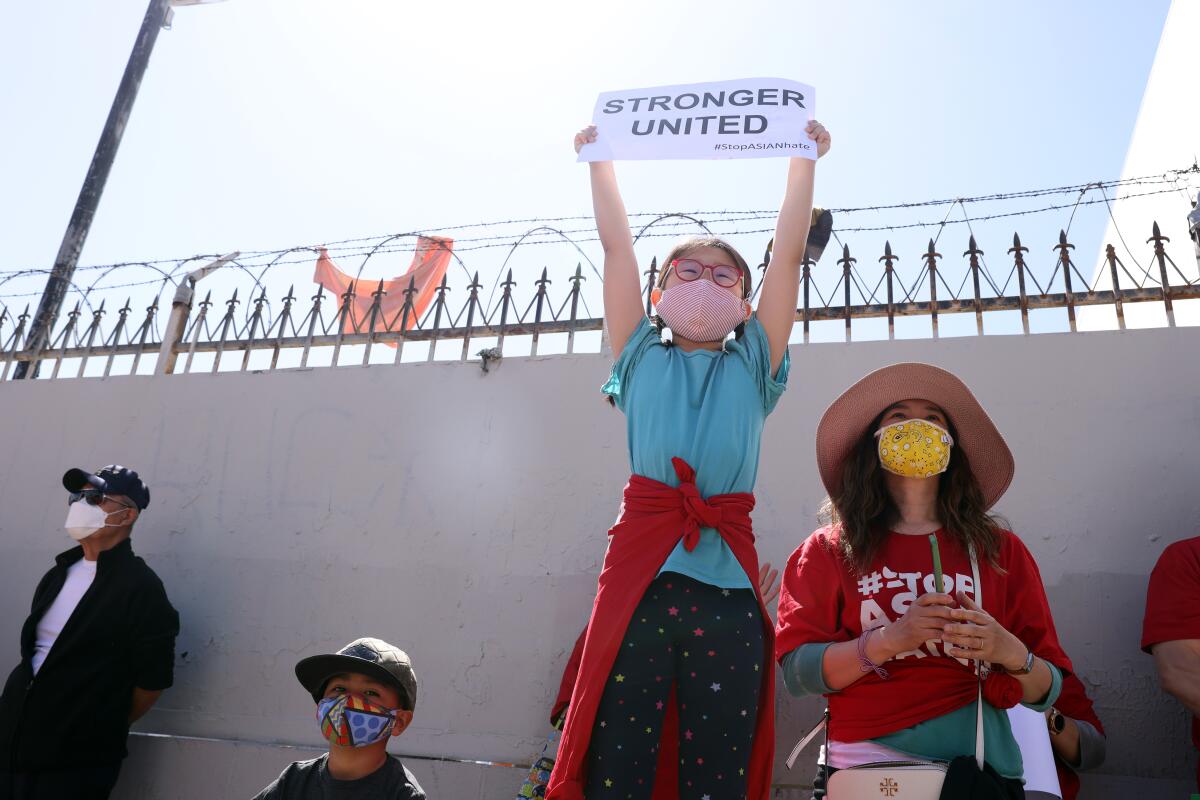
Dao said the attacks have brought intergenerational divisions within families over how to respond, “and my family’s not exempt from that.” But she hopes that just seeing people like her in the streets raising their voices will inspire others to speak out.
Huynh, who is also Vietnamese American, said she attended the Koreatown rally to give voice to the often unspoken “fear, anger and sadness, especially for our older generation.”
She said her grandmother and father have been assaulted in the past, “but they didn’t report it to the cops because they don’t want to be an inconvenience. We’re always told, ‘Don’t cause trouble.’”
“Well, I can’t be silent anymore,” Huynh said. “I felt like I needed to speak out for those who either can’t or won’t.”
The march ended at Olympic Boulevard and Normandie Avenue, where elected officials, community leaders and other speakers took to the microphone.
They told of Asian Americans being attacked in their homes and businesses, of being screamed at and spit on. They emphasized that the recent wave of attacks is only the latest in a history of anti-Asian discrimination going back more than a century in this country.
“Asian hate crime was out there long before COVID-19, but really was exacerbated by the former occupant of the White House, when he used language like ‘China virus’ and ‘kung flu,’ and we’ve been seeing an alarming rise,” said Steve Kang, vice president of the Korean American Federation of Los Angeles and one of the lead organizers of the rally.
“We’re seeing our elders being attacked. They’re being pushed, they’re being kicked. Brutal killings are happening,” Kang said. “So we felt that we can no longer stay silent and we have to rise. And I think Atlanta was the final straw for many of us.”
Kang estimated that more than 1,000 people attended the rally. Many participants said they are simply fed up.
“My mother, when she brought me here, told me, ‘This is the land of the free and you can live the American dream,’” said Kathy Wu of Los Angeles. “But now, our mothers, our parents, they’re being attacked. And I’m scared for my community.”
Bruce Lie, vice president of an Indonesian diaspora group, said he marched to support the entire Asian American and Pacific Islander community, especially Korean Americans who were among the victims in the Atlanta killings.
Lie has lived in Alhambra for two decades and said he has never seen as much hate directed toward his predominantly Chinese neighbors as over the last year.
“I’m here to say enough is enough,” Lie said.
Community groups are planning additional rallies and vigils. At the same time, they are pushing for tangible legislative changes to support the victims.
That includes proposed legislation to establish a unified statewide hotline for Asian Americans to report hate incidents in the languages they speak, Kang said.
“The Asian American community for a long time has been viewed as an invisible group within the larger United States, and we wanted to really show, in big numbers, that we are no longer invisible,” Kang said. “We have to lift up our voices and say, ‘Stop Asian hate.’”
More to Read
Sign up for Essential California
The most important California stories and recommendations in your inbox every morning.
You may occasionally receive promotional content from the Los Angeles Times.
